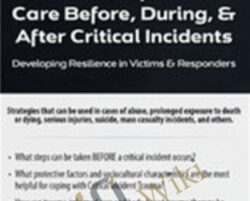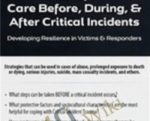Critical Incident Trauma: How to Prepare for It, Cope with It, and Survive after ItMany current offerings on critical incident trauma fall short by dealing almost exclusively with the aftermath of the event, the symptoms of trauma exposure, and basic treatment options. Successful coping also requires prevention and intervention, as well as an understanding of pre-event, event, and post-event factors that impact trauma and a negative or resilient response to it.In this recording, Dr. Carrie Steiner, a Police Psychologist and former Chicago police officer, shows you an engaging exploration of how to positively impact the lives of victims, responders, and law enforcement agencies before, during, and after critical incidents. Dr. Steiner’s professional experience is invaluable as she shares first-hand knowledge of the successes that accompany the use of Crisis Intervention Team (CIT) programs, as well as clinical strategies such as EMDR, Prolonged Exposure, Yoga, and somatic experiencing. Her presentation is practical and realistic, with honest dialogue about how to handle both the factors that we can control in a traumatic event, and those we cannot.Describe how trauma affects the brain, emotions, and cognition, and how this informs the clinician’s choice of treatment interventionsIdentify individual and sociocultural features in clients that serve as risk or protective factorsAnalyze the clincial interventions that a clinician may choose from to intervene pre-event, event, and post-eventExplain re-traumatization issues that might surface post-event, and describe how this informs the clinician’s choice of treatment interventionsAnalyze critical event factors that impact the coping response of the client to traumaDetermine what trauma-informed and body-based trauma clinical interventions would be best for a client based on observed symptomsTRAUMA INFORMED CARE: TRAUMA AWARENESS AND BRAIN RESPONSESocial-ecological model of trauma impactHigh clinical risk of developing trauma disordersBrain development and traumaBidirectional relationships of trauma, substance abuse, and mental illnessDSM-5®: PTSD, ASD, trauma-related disordersPRE-EVENT FACTORS THAT SHAPE TRAUMA COPING ABILITIESAdverse Life Events (ACEs) StudyGeneticsAge, gender, sexual orientation/gender identity effectsFamily historyPre-existing mental health factorsInterventionsEducation on trauma-informed careDecreasing secondary trauma for professionals and othersUtilization of crisis servicesCrisis Intervention Team (CIT) programEVENT FACTORS THAT SHAPE TRAUMA RESPONSE16 critical factors that impact development of a trauma disorderExpected vs. unexpected traumaNatural vs. human caused traumaIndividual vs. group traumaPhysical injuryCommunity and cultureHistorical/generational traumaMass traumaInterventions Preparedness and mental rehearsalPsychoeducation about normal stress reactionsUtilizing active coping skillsLimit exposureSocial supportPOST-EVENT FACTORS THAT SHAPE TRAUMA HEALINGKnowledge, access, and utilization of trauma servicesInterventions Trauma-informed care (EMDR, CBT, CPT, neurofeedback, and Prolonged Exposure)Body-based trauma therapy (EMDR, yoga, somatic experiencing, EFT, sensory motor therapy)Video example of EMDRRe-traumatization issuesResilience: cultural, racial, and ethnic characteristics10 key protective traitsGet Trauma-Informed Care Before, During, & After Critical Incidents: Developing Resilience in Victims & Responders – Carrie Steiner, Only Price $80Tag: Trauma-Informed Care Before, During, & After Critical Incidents: Developing Resilience in Victims & Responders – Carrie Steiner Review. Trauma-Informed Care Before, During, & After Critical Incidents: Developing Resilience in Victims & Responders – Carrie Steiner download. Trauma-Informed Care Before, During, & After Critical Incidents: Developing Resilience in Victims & Responders – Carrie Steiner discount.
 Once-in-37-year Conjunction of Pluto-Saturn, the 2 Most Feared Planets in the Solar System: During the Peak Time
₹3,818.00
Once-in-37-year Conjunction of Pluto-Saturn, the 2 Most Feared Planets in the Solar System: During the Peak Time
₹3,818.00
 The Most Thorough and Broad-Spectrum Clearing of Self-Limiting Karmic Vows I’ve Ever Done, Part 2: The Second 31 Categories of Vows (Out of 94) (Recorded July 2020)
₹3,818.00
The Most Thorough and Broad-Spectrum Clearing of Self-Limiting Karmic Vows I’ve Ever Done, Part 2: The Second 31 Categories of Vows (Out of 94) (Recorded July 2020)
₹3,818.00
Trauma-Informed Care Before, During, & After Critical Incidents: Developing Resilience in Victims & Responders – Carrie Steiner
₹12,616.00




